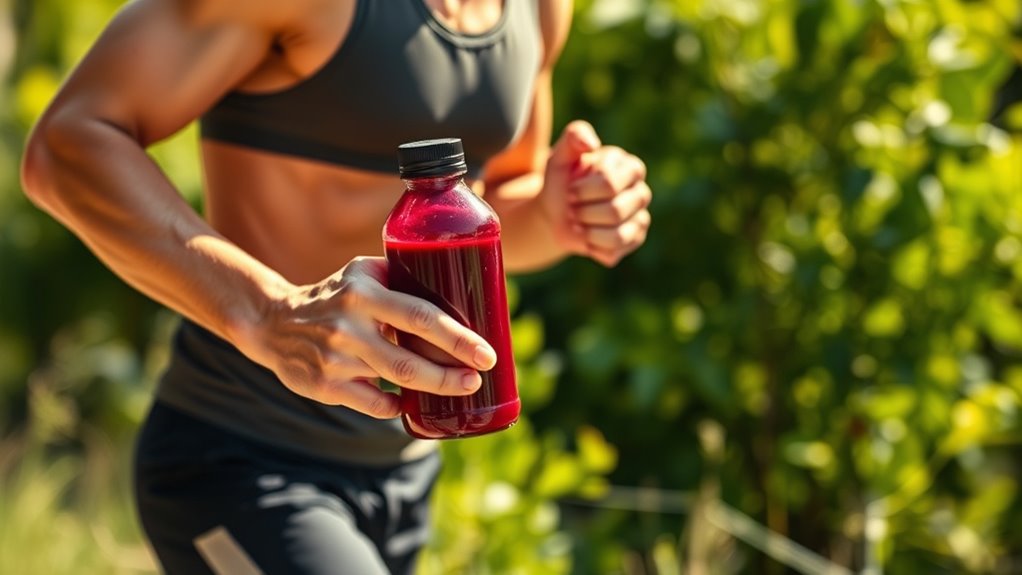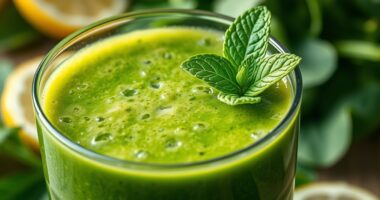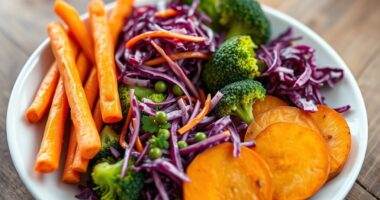You’re switching to beetroot juice because it’s a natural way to boost endurance and improve your performance. Its high nitrate content improves blood flow and oxygen delivery to muscles, helping you train longer and recover faster. Many athletes find it tastes great with fruits or blended into smoothies, making it easy to include in your routine. Keep exploring to discover how this powerful drink can give you an athletic edge naturally.
Key Takeaways
- Beetroot juice’s high nitrates convert to nitric oxide, improving blood flow and oxygen delivery during endurance activities.
- Its antioxidants and anti-inflammatory properties support faster recovery and reduce exercise-induced oxidative stress.
- Natural nitrate sources enhance stamina and enable longer, more efficient training sessions without synthetic supplements.
- The earthy flavor can be balanced with fruits, making it a palatable, natural alternative for sustained athletic performance.
- Easy preparation and versatile consumption options encourage daily intake, promoting consistent endurance benefits for athletes.

Many athletes are turning to beetroot juice as a natural way to boost their performance. You might wonder why this vibrant red beverage has gained such popularity among those pushing their physical limits. The answer lies in its impressive nutrition benefits and its compatibility with various taste preferences. Beetroot juice is packed with nitrates, which your body converts into nitric oxide—a compound that improves blood flow and oxygen delivery to your muscles. This process helps you perform more efficiently, especially during endurance activities like running, cycling, or swimming. Regular consumption of beetroot juice has been linked to increased stamina, allowing you to train longer and recover faster. Plus, it’s a natural alternative to synthetic supplements, making it appealing to athletes seeking cleaner, whole-food options.
When it comes to taste preferences, beetroot juice can be a bit polarizing, but many find it surprisingly palatable once they get used to it. Its earthy flavor might initially seem strong compared to other fruit juices, but blending it with fruits like apple, carrot, or lemon can create a more enjoyable, balanced drink. If you’re sensitive to the taste, starting with smaller servings and gradually increasing your intake can help your palate adjust. Some athletes even prefer cold-pressed or organic varieties, which tend to have a fresher, more vibrant flavor profile. The versatility of beetroot juice also allows you to incorporate it into smoothies or shots, making it easier to customize according to your taste and nutritional needs. Over time, many develop a liking for its natural sweetness and rich, earthy undertones.
Beyond taste, you might appreciate the simplicity of adding beetroot juice to your routine. It’s easy to prepare or find pre-made versions at your local store, giving you quick access to its performance-enhancing benefits without much hassle. In terms of nutrition benefits, beetroot juice provides more than just nitrates. It contains antioxidants, vitamins, and minerals like vitamin C, potassium, and manganese, all of which support overall health and athletic recovery. These nutrients help reduce inflammation, combat oxidative stress, and keep your body functioning at its best, especially during intense training periods.
Frequently Asked Questions
How Much Beetroot Juice Should I Consume Daily?
For your daily intake of beetroot juice, aim for about 250 to 500 milliliters, which provides roughly 300 to 600 milligrams of dietary nitrates. The proper dosage depends on your body size and activity level, but starting with 250 ml and adjusting as needed is a good approach. Consuming it about 2-3 hours before exercise maximizes benefits. Always listen to your body and consult a healthcare professional if unsure.
Are There Any Side Effects From Drinking Beetroot Juice?
They say “prevention is better than cure,” so it’s wise to contemplate side effects. Drinking beetroot juice might cause stomach upset or allergic reactions, especially if you have beetroot allergies. While generally safe, consuming in moderation helps avoid issues. If you notice any adverse effects like stomach pain or allergic symptoms, cut back or stop and consult a healthcare professional. Stay informed to enjoy the benefits safely.
Can Beetroot Juice Improve Recovery After Intense Workouts?
You can definitely see improvements in recovery after intense workouts by drinking beetroot juice. Its antioxidant effects help reduce inflammation and muscle soreness, making recovery quicker. Incorporating beetroot juice into your recovery nutrition supports muscle repair and replenishment of nutrients. By boosting blood flow and providing essential nitrates, it helps you bounce back faster and get ready for your next workout more effectively.
Is Beetroot Juice Suitable for All Types of Athletes?
You might wonder if beetroot juice suits every athlete. The truth is, it’s not for everyone. If you have dietary restrictions or medical conditions like low blood pressure, it could pose risks or interfere with medications. Always check with your healthcare provider before adding it to your routine. While many athletes benefit, individual health factors determine if beetroot juice is a safe, effective choice for your endurance goals.
How Long Does It Take to See Endurance Benefits?
You might see endurance benefits from beetroot juice within 1 to 3 hours after consumption, but timing recommendations vary based on individual response variability. Some athletes notice improvements sooner, while others may need to consume it consistently over several days to maximize effects. To find what works best for you, experiment with timing and dosage, paying close attention to how your body responds to optimize your endurance gains.
Conclusion
So, next time you hit the gym or the trail, consider swapping your usual drink for beetroot juice. It’s like revealing a secret weapon that supercharges your endurance and keeps you going longer than you ever thought possible. Don’t just take their word for it—try it yourself and feel the difference. With beetroot juice, you’re not just running; you’re soaring past your limits, turning every workout into an epic victory.










